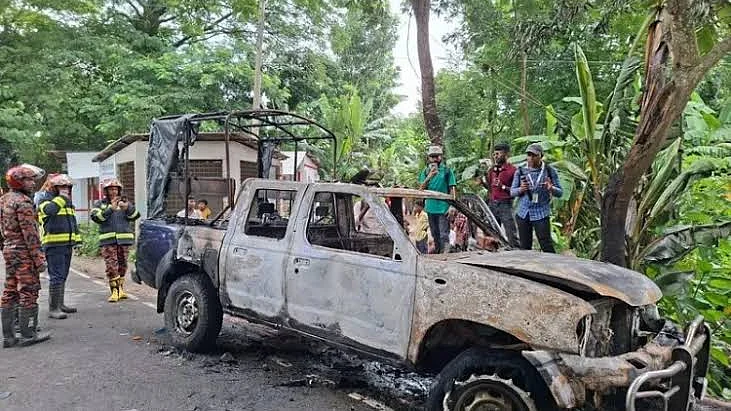3 people killed in clashes during NCP rally in Bangladesh founder’s hometown
Chief adviser Muhammad Yunus called the violence “utterly indefensible”, while the National Citizen Party vowed to "liberate Gopalganj from Mujibism"

Three people were killed in clashes surrounding a rally by the National Citizen Party (NCP) on 16 July, Wednesday, in the hometown of Bangladesh's founder Sheikh Mujibur Rahman in Gopalganj town, according to media reports.
The hometown of Mujibur Rahman, also known as Bangabandhu, turned into a virtual battlefield as hundreds of supporters of his daughter and deposed prime minister Sheikh Hasina’s Awami League clashed with police ahead of the planned march of student-led NCP to the district, Prothom Alo newspaper reported.
Two of the deceased have been identified as Dipto Saha, 25, and Ramazan Kazi, 18, the paper said.
The deceased were brought to Gopalganj General Hospital with gunshot injuries, doctors said, adding that nine more people were being treated at the facility with bullet wounds.
Four extra platoons (nearly 200 soldiers) of the paramilitary Border Guard Bangladesh (BGB) were rushed to Gopalganj as authorities vowed stern action against those who carried out attacks on the NCP.
Chief adviser Muhammad Yunus’ office said a 22-hour curfew in Gopalganj has been ordered from 8 p.m. on Wednesday, adding the perpetrators of the attack on the NCP would not go unpunished.
According to media reports and witnesses, the protesters, equipped with bamboo sticks and brickbats, clashed with police and security forces, including the army and paramilitary BGB.
The security arrangements were made to facilitate a planned rally by the newly floated National Citizen Party (NCP), which emerged as an offshoot of the Students against Discrimination movement in February, with the support of interim government chief Muhammad Yunus.
Protesters vandalised the vehicles of police and that of the local administrative chief, alongside launching an assault on the NCP convoy, prompting the law enforcement agencies to fire gunshots, according to reports.
The NCP managed to proceed with the rally on the vandalised stage with broken sound systems, chaired by its convenor Nahid Islam, vowing to ensure justice themselves if law enforcement agencies failed to do so.
Islam and influential NCP leader Hasnat Abdullah promised to dismantle the remnants of "Mujib's legacy".
The NCP convenor declared that if justice over the attack on their rally venue was not delivered promptly, their party would return to "liberate Gopalganj from Mujibism" with their own hands.
“We are going to bring our justice if the police forces fail," said Islam.
The comments came shortly after NCP leader Sarjis Alam blasted the attack on their motorcade earlier in the day, calling on everyone to rush to Gopalganj and put up a resistance against members of the banned Awami League.
"In Gopalganj, the agents of the killer Hasina have attacked us. The police are just standing by, watching the drama, retreating," Alam said in a Facebook post.
“The use of violence today in Gopalganj is utterly indefensible. Preventing young citizens from peacefully holding a rally to commemorate the first anniversary of their revolutionary movement is a shameful violation of their fundamental rights,” a statement by Yunus' office read.
“This heinous act — allegedly carried out by members of the banned Awami League’s Chhatra League and AL activists — will not go unpunished. The perpetrators must be swiftly identified and held fully accountable. There is no place for such violence against any citizen of Bangladesh,” the chief adviser’s office said.
A local newspaper editor, preferring anonymity, said ordinary people and even former prime minister Khaleda Zia’s Bangladesh Nationalist Party (BNP) joined hands with local Awami League leaders and activists to prevent the NCP.
In February, thousands of protesters set fire to Mujibur Rahman's residence in 32 Dhanmondi in Dhaka, which was converted into a memorial.
Hasina, 77, has been living in India since 5 August 2024, when she fled Bangladesh following a massive student-led protest that toppled her Awami League's 16-year regime.
Hasina's father is widely viewed as an independence hero, but anger at his daughter has tarnished his legacy.
He was killed along with most of his family members in a coup staged by a group of junior or mid-ranking military officers on 15 August 1975. Hasina and her sister Rehana survived as they were in Germany.
Follow us on: Facebook, Twitter, Google News, Instagram
Join our official telegram channel (@nationalherald) and stay updated with the latest headlines
